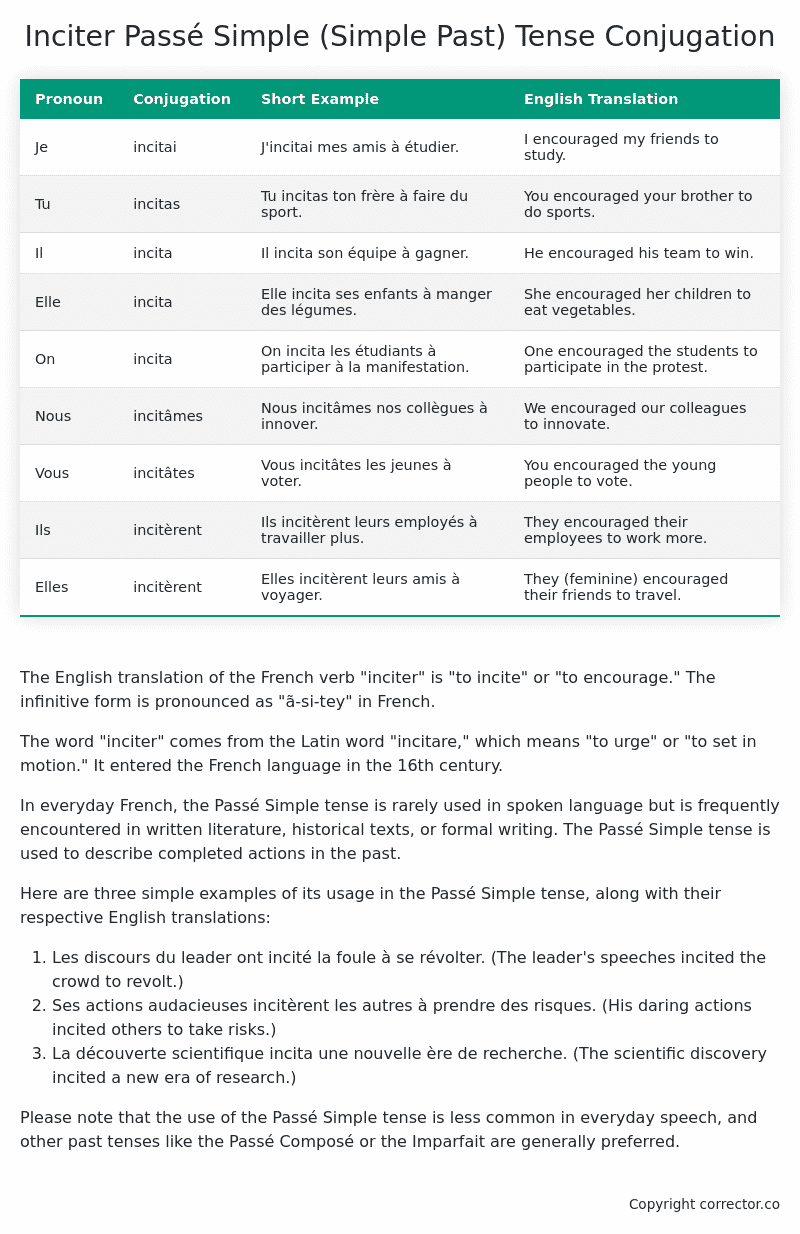Passé Simple (Simple Past) Tense Conjugation of the French Verb inciter
Introduction to the verb inciter
The English translation of the French verb “inciter” is “to incite” or “to encourage.” The infinitive form is pronounced as “ã-si-tey” in French.
The word “inciter” comes from the Latin word “incitare,” which means “to urge” or “to set in motion.” It entered the French language in the 16th century.
In everyday French, the Passé Simple tense is rarely used in spoken language but is frequently encountered in written literature, historical texts, or formal writing. The Passé Simple tense is used to describe completed actions in the past.
Here are three simple examples of its usage in the Passé Simple tense, along with their respective English translations:
- Les discours du leader ont incité la foule à se révolter. (The leader’s speeches incited the crowd to revolt.)
- Ses actions audacieuses incitèrent les autres à prendre des risques. (His daring actions incited others to take risks.)
- La découverte scientifique incita une nouvelle ère de recherche. (The scientific discovery incited a new era of research.)
Please note that the use of the Passé Simple tense is less common in everyday speech, and other past tenses like the Passé Composé or the Imparfait are generally preferred.
Table of the Passé Simple (Simple Past) Tense Conjugation of inciter
| Pronoun | Conjugation | Short Example | English Translation |
|---|---|---|---|
| Je | incitai | J’incitai mes amis à étudier. | I encouraged my friends to study. |
| Tu | incitas | Tu incitas ton frère à faire du sport. | You encouraged your brother to do sports. |
| Il | incita | Il incita son équipe à gagner. | He encouraged his team to win. |
| Elle | incita | Elle incita ses enfants à manger des légumes. | She encouraged her children to eat vegetables. |
| On | incita | On incita les étudiants à participer à la manifestation. | One encouraged the students to participate in the protest. |
| Nous | incitâmes | Nous incitâmes nos collègues à innover. | We encouraged our colleagues to innovate. |
| Vous | incitâtes | Vous incitâtes les jeunes à voter. | You encouraged the young people to vote. |
| Ils | incitèrent | Ils incitèrent leurs employés à travailler plus. | They encouraged their employees to work more. |
| Elles | incitèrent | Elles incitèrent leurs amis à voyager. | They (feminine) encouraged their friends to travel. |
Other Conjugations for Inciter.
Le Present (Present Tense) Conjugation of the French Verb inciter
Imparfait (Imperfect) Tense Conjugation of the French Verb inciter
Passé Simple (Simple Past) Tense Conjugation of the French Verb inciter (You’re reading it right now!)
Passé Composé (Present Perfect) Tense Conjugation of the French Verb inciter
Futur Simple (Simple Future) Tense Conjugation of the French Verb inciter
Futur Proche (Near Future) Tense Conjugation of the French Verb inciter
Plus-que-parfait (Pluperfect) Tense Conjugation of the French Verb inciter
Passé Antérieur (Past Anterior) Tense Conjugation of the French Verb inciter
Futur Antérieur (Future Anterior) Tense Conjugation of the French Verb inciter
Subjonctif Présent (Subjunctive Present) Tense Conjugation of the French Verb inciter
Subjonctif Passé (Subjunctive Past) Tense Conjugation of the French Verb inciter
Subjonctif Imparfait (Subjunctive Imperfect) Tense Conjugation of the French Verb inciter
Subjonctif Plus-que-parfait (Subjunctive Pluperfect) Tense Conjugation of the French Verb inciter
Conditionnel Présent (Conditional Present) Tense Conjugation of the French Verb inciter
Conditionnel Passé (Conditional Past) Tense Conjugation of the French Verb inciter
Conditionnel Passé II (Conditional Past II) Tense Conjugation of the French Verb inciter
L’impératif Présent (Imperative Present) Tense Conjugation of the French Verb inciter
L’impératif Passé (Imperative Past) Tense Conjugation of the French Verb inciter
L’infinitif Présent (Infinitive Present) Tense Conjugation of the French Verb inciter
L’infinitif Passé (Infinitive Past) Tense Conjugation of the French Verb inciter
Le Participe Présent (Present Participle) Tense Conjugation of the French Verb inciter
Le Participe Passé (Past Participle) Tense Conjugation of the French Verb inciter
Struggling with French verbs or the language in general? Why not use our free French Grammar Checker – no registration required!
Get a FREE Download Study Sheet of this Conjugation 🔥
Simply right click the image below, click “save image” and get your free reference for the inciter Passé Simple tense conjugation!

Inciter – About the French Passé Simple (Simple Past) Tense
Formation
Usage
Narration
Historical Context
Interactions with other tenses
Passé Composé
Imparfait
Conditional and Subjunctive
Summary
I hope you enjoyed this article on the verb inciter. Still in a learning mood? Check out another TOTALLY random French verb conjugation!


